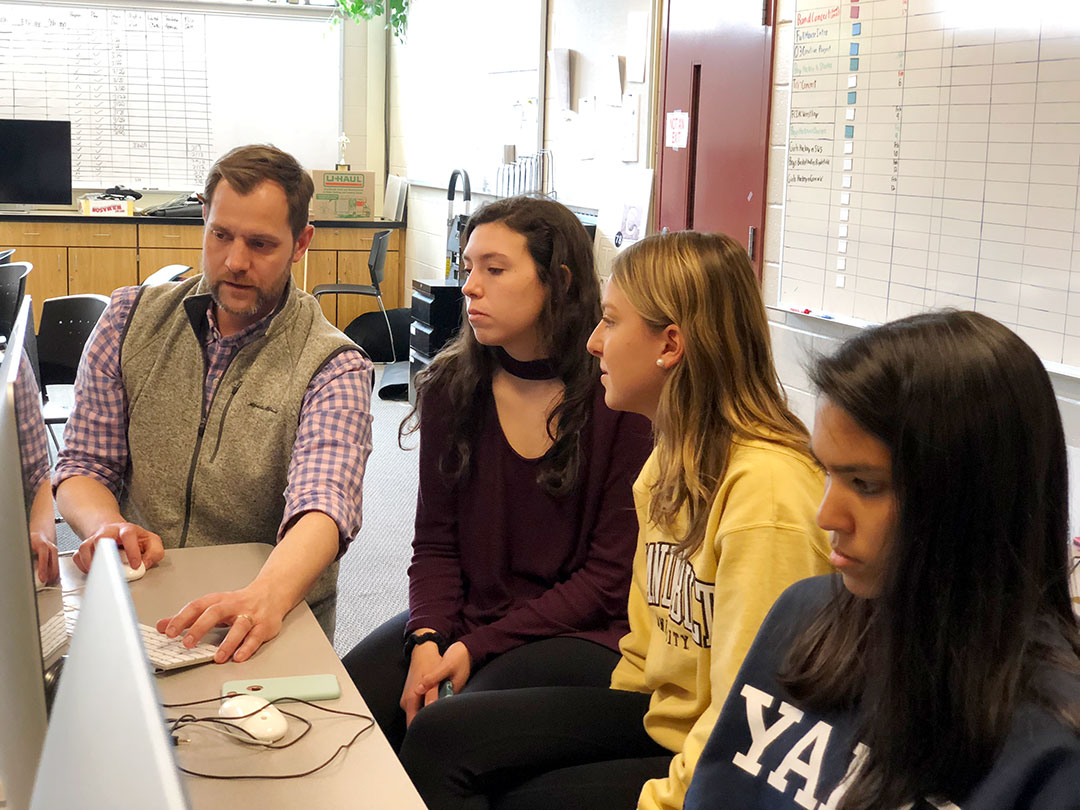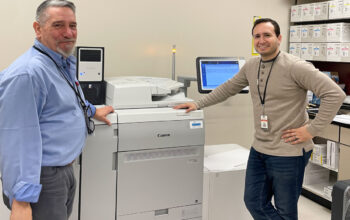Thomas Welch, Reporter
@twelchcourant
The wide range of electives offered at the school can be overwhelming: everything from car care, to interior design, to fashion merchandising. Of course, not every class serves the same purpose. Some are intended to introduce students to a subject, others to expand their knowledge on a topic they’re familiar with. Some are more lectures and notes, others more hands-on. Because of all this, finding the right class can be difficult. But when you do, there will also be more classes to continue in that subject.
As well as the wide variety of intro courses, there are advanced classes with more complex and intricate material. Students can develop more of an understanding in nearly any class they choose. The way the different levels of classes are structured differ between every class, meaning no two courses are alike.
The Music Technology classes offered are an example of a more traditional way the advanced classes have been approached. Offered are Tech 1, 2, 3, and 4, all single-semester classes. Anna Moody, one of the teachers for the class, describes it as a more broad, more all-around music class. “Students use the computer as their instrument, and because it’s digital, they can create music much simpler than a traditional musician would,” she said. “The course covers a lot of different tasks such as production, mastering, sampling, DJ-ing.”

Over the course of the program, the class content becomes very different. Every new class is a new experience, ensuring the courses don’t become repetitive. “In Tech 1, they have to know the fundamentals of Logic, and of the music itself. Once they get those down, they learn how to compose in Tech 2,” Moody said. “Then, they learn more theory and get into depth on theory and synthesis. When they get up to Tech 4, each student has determined their strengths and weaknesses. It becomes very self-guided.”
The beginner’s classes focus on basics and progressively have less grip on the structure. It fades from direct to passive control, eventually becoming a completely new class. By the time Tech 4 comes around, everything has changed. “It takes about five weeks for one project, but they work collaboratively. One student who is great at making beats can work with a student who is skilled in melody writing and they both assist each other for their pieces,” Moody said. Music Tech 4 has the tasks of making the Senior Mixtape, the graduation recessional, and the NHS processional. It adds a new level of responsibility to the students producing the work.
Just because the students become more knowledgeable within the class doesn’t mean people aren’t learning. They are still collaborating and sharing information with each other. Additionally, Ms. Moody learns from her students. “I love that I learn so much from the students. There’s so much to learn. Having given them free reign, I love to see the growth,” she said. “Looking at Tech 4, they’re so motivated to come in and make their music. Giving them the freedom to go out and learn everything and bring it back to me, I feel like I’m learning just as much as they are.”
However, not every class functions the way the Music Tech classes do. The business classes are structured in a more unconventional manner. The program recently underwent some restructuring, combining a number of previously available classes into an overarching entry-level class. The business teacher, Rachel Martinich Martinich, came into the program when the change was made, saying, “I had a lot of fun coming up with which units to teach in Principles & Practices. I was able to take student input and alter it after the first year running the course. I have found that students really enjoy the topics we cover.”

Because of this change, Ms. Martinich was able to select the topics she thought would engage students while including the most important content as possible. It had to apply to every student coming in, while also providing the general knowledge necessary to have a functioning class. “Students normally have a ‘dream career’ in their head that they’d like to pursue but do not know what type of schooling, time commitment, or certification a lot of these careers entail,” she said. “Along with resumes and job applications, students also learn how to fill out common new hire paperwork, like the W4, I9, and direct deposit forms.”
Ms. Martinich thinks highly of the class she helped to design. “This course is a great overview of some fields of business. Since it is only a half year I can only cover so much material, but I think that students can get a good idea about the fields I cover,” she said. ”It’s important to learn these basics before diving deeper into the subject.”
After taking Principles & Practices, more courses are provided with similar content. Though a continuation of that class specifically isn’t offered, Future Business Leaders is another option. It is a full-year elective as opposed to the single semester that Principles & Practices. Ms. Martinich describes the class experience, saying, “It is more of a lab class. Students apply for certain positions within the School Store, like merchandise manager, marketing head, and general manager. With the help of Junior Achievement, student get their product up and running and can make a profit. Last year, the class created the SmartWallets that can currently be bought in the School Store and the Spirit Store.”
Unlike Principles & Practices, there is a Future Business Leaders 2, available to anyone wishing to get more involved in business. There is also the Business Ventures Club, run by John Peiser and Gabriel Drake, that allows students to talk about business with other sharing interests.
Two classes that operate differently than most others are Journalism and TV Broadcast. The Courant, the school newspaper, and the Friday Announcements are both run by the classes respectively. Roman Cebulski, the teacher for both classes, runs the classes very similarly. “Any time a student knows that their work is being viewed by people outside of the class, there’s an inherent willingness to produce their best work. You want to get your story right, because that story goes in the paper and online,” he said. “It makes kids more responsible and professional. The crew here does a great job, and they always have.”

Because of this, the classes are very successful. About 90% of Journalism 1 students return for Journalism 2, and the majority of kids that take TV 2 continue for the rest of the classes. Having taken all of these classes, students are engaged enough that they study it in college as well. “The communications field has definitely grown, it’s not your traditional father’s journalism. It’s more interactive and technologically connected,” said Cebulski. “We have some alumni come back and share their experience with the class, like our own Sarah McCloskey who is currently with News 8.”
That effect is more prominent in TV, due to increasing activity in the field. “Probably a little bit more go on to pursue a career in media than from Journalism, because broadcasting and media production seems to be a growing field at the moment,” Mr. Cebulski said. “A lot of kids are studying this in college. A large portion of kids do continue forward. Most of my seniors in advanced TV are doing something in media in the future.
Teaching the students in a creative way and preparing them for the years ahead is one of the main goals of the classes. “Kids nowadays don’t want to be sat down and lectured, they want to get out and do something. They’ll screw up at times, which is ok, because they’re learning.,” said Cebulski. “Over time, they’ll gain more leadership and responsibility within the class. We’re trying to get kids to better thinkers, managers, and critical thinkers.” Having said this, the kids seem to be doing a pretty good job: Courants are picked up all around the school during distribution days, and the announcements are enjoyed in every classroom.
There are many reasons to take each of these classes, but it boils down to personal preference. There’s something out there for everybody, and the electives at the school do a great job of providing nearly every kind of class. Though self-selecting your courses through Powerschool is no longer available, you can still meet with your counselor to change the electives you would like to take. Remember, this is still a point at which you can try different things out, and see what you like. Who knows, maybe you’ll find the work you’re passionate for.




